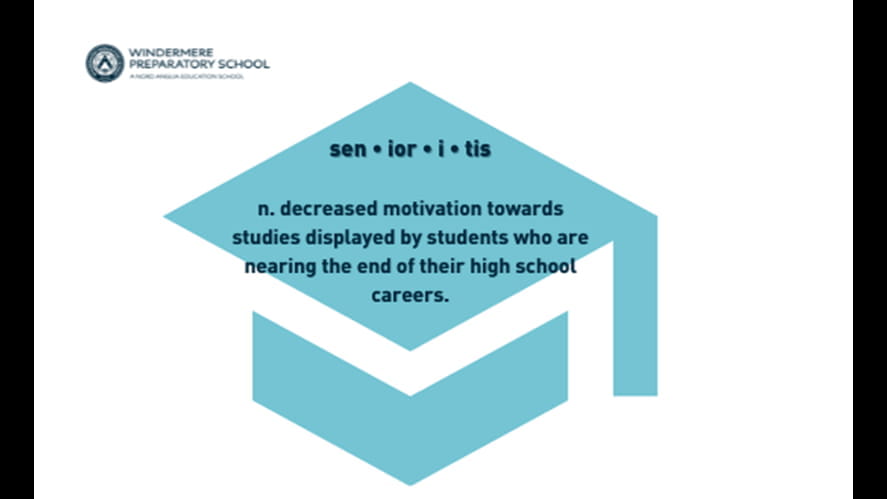We use cookies to improve your online experiences. To learn more and choose your cookies options, please refer to our cookie policy.


You’re finally at the end of your high school career; seven semesters down, and only one to go. Most college-bound seniors, and 100% of the Class of 2022 at Windermere Preparatory School, have learned where they are going to spend the next four years, and are looking at dormitory choices at this point. It may seem like the pressure is off and you can already begin experiences in the next chapter of your life.
The transition to the next chapter may seem like it’s already here, but don’t move so quickly and let your guard down. Most seniors have heard of “Senioritis” by now and are actually looking forward to coasting through their last semester. While many students may have done this in the past, it’s a dangerous assumption that could cost you admission to your college of choice.
What is it?
Senioritis, a tongue-in-cheek term for a decline in high school seniors’ motivation, is often treated as a “kids will be kids” phenomenon. While this can be light-hearted and often not taken seriously, it can truly have an effect on students’ immediate and future academic performances.
Why does it matter?
Senioritis can cause immediate harm and influence a student’s future.
School counselors are intimately aware of the potential negative consequences of senioritis, and support and assist in the continued motivation of a students’ academic effort until they walk across the graduation stage. The end of senior year can be a very exciting time including Prom, final performances, senior days at athletics events, and so much more. It is critical that students continue to stay engaged in school to learn critical life skills needed for success in college and create exciting and fun memories of the end of the high school years.
Decisions to not take studies seriously or not even attend classes can impact the learning trajectory of your academic success, which will make it a more difficult transition to post-secondary schools. Freshman year at college is difficult enough as it is; being in a new environment, unfamiliar with professors teaching styles, navigating the campus, and being completely independent. Study habits alone may not make you the most successful on campus, however, having the discipline to remain focused on your academics, preparing for the future, and remaining diligent in all activities may be setting you up for success.
A common misnomer about college admissions is that once you are accepted to college, you no longer need to be as strict or diligent about your academic performance. This is the exact opposite of the truth. In the fine print, once colleges extend an acceptance, they are expecting you to completely fulfill your end of the deal when it comes to academic success. It’s ok to all of a sudden have “B” instead of the “A” you were expecting, but at the same time, that [severely] lower grade could affect your overall GPA. Admissions councils at college are looking to fill their freshman classes with well-rounded students who intend to study hard and, hopefully, make some noteworthy research while on their campus. They don’t want students who have since given up on academics and show lack of discipline and determination. Even if an offer is not rescinded, other long-term damage can occur — including being placed on academic probation, which burdens an already-stressed-out college freshman with even more pressure. Additionally, financial aid that’s based on merit can be affected.
How to mitigate "senioritis".
Students can turn to school counselors for help to combat senioritis. School counselors do a variety of things to help mitigate senioritis, including helping students engage in tasks that are relevant to their personal interests and goals. The College Board recommends an approach that supports “deeper student engagement” including but not limited to the following:
Maintain a challenging course load — whether it be honors, AP (advanced placement) or HL IB (high-level International Baccalaureate), stay in classes that will challenge you and excite you to show up to school every day.
Enjoy your senior experience — but do it responsibly through positive activities that will foster healthy relationships, additions to your resume, and overall well-roundedness.
Find a summer job or internship — this will help you keep a structured schedule throughout the summer as well as maintaining general responsibilities, if you aren’t already headed to campus for summer freshman courses.
Keep a calendar of deadlines and other important dates — to help you stay focused and accomplish goals without being overwhelmed.
Though senior year is a time for you to cherish and celebrate, senioritis can hinder you both in the short term and the years ahead. However, by recognizing the symptoms and taking steps to avoid the ill effects, you can help mitigate the consequences to succeed in senior year and beyond.